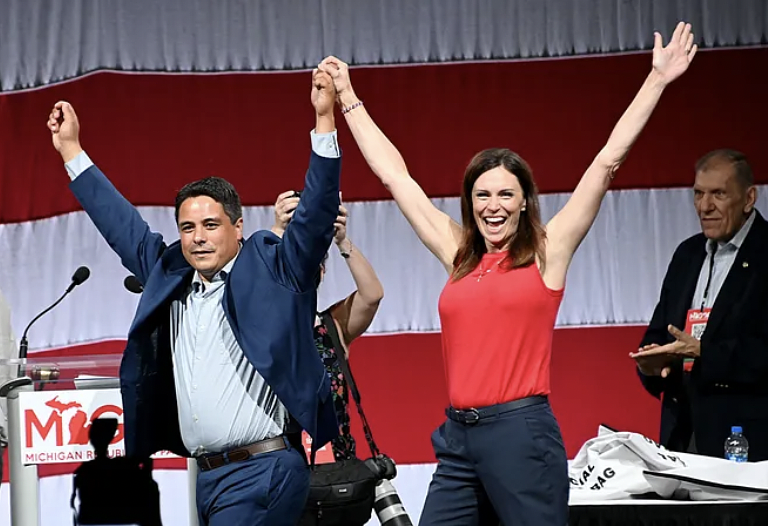
Michigan GOP pursues registration fee to fund upcoming conventions
The Michigan Republican Party plans to impose a $50 registration fee for delegates at its February convention, a proposal that was detailed in an early Tuesday morning email to GOP insiders and was already stirring controversy.
The party has traditionally not charged convention delegates to participate in the gatherings, which include thousands of people selected at the county level to attend the events. However, supporters of the proposed rule change argued a fee was necessary to financially support the meetings going forward.
At the Feb. 17-18 convention in Lansing, the Michigan GOP will select a new chairperson. The party's state committee is expected to consider imposing the registration fee next week.
The proposal for a fee came as some candidates to lead the party push to alter Republicans' funding strategy, wanting to shift from focusing on large donors to putting a larger emphasis on contributions from grassroots backers, including delegates themselves.
"We are the only state in the country that doesn't charge for registration to attend convention," current Michigan Republican Party Chairman Ron Weiser wrote in a Tuesday email to state committee members.
"Because of the large size of our conventions, the cost ranges between $140,000-$200,00(0) per convention. And it's increasing in price with every convention we do. This cycle we have had three (conventions). This is simply not sustainable and we must make this change."
The Detroit News obtained Weiser's message Tuesday, and a source who was not authorized to speak on the matter confirmed receiving the email from the chairman.
Michigan Republicans suffered a series of losses in the Nov. 8 election, including Democratic Gov. Gretchen Whitmer winning a second term by about 11 percentage points over GOP challenger Tudor Dixon.
Some in the party, such as Meshawn Maddock, the current co-chairwoman, have tied the defeats to large traditional donors refusing to support some Republican candidates.
Under the registration fee proposal, those who sign up in advance, including alternates and guests, would pay $50. There would also be a "same day registration fee" of $75 for others.
In recent months, mystery has lingered over the condition of the Michigan Republican Party's finances. Weiser, a wealthy businessman from Ann Arbor, has donated millions of his own dollars to support the party while serving as chairman.
But he is not seeking another term in the position, and the candidates running for the job, including former attorney general hopeful Matt DePerno and former secretary of state nominee Kristina Karamo, struggled to raise money for their own campaigns.
In a Tuesday interview, Michigan GOP Chief of Staff Paul Cordes said the Michigan Republican Party has the money needed to put on the upcoming convention.
"It has very little do with that," Cordes said of the proposal and its relation to the party's financial situation.
Instead, Cordes said the move would align the Michigan GOP with what other state parties do.
The decision is economics, said Mike Hewitt, chairman of the Michigan Republican Party's policy committee.
"We're literally the only ones that don't charge," Hewitt said.
The Illinois Republican Party also charges a $50 convention registration fee, according to information from the Michigan Republican Party.
As for the Michigan Democratic Party, people must be party members to participate in Democratic state conventions. The party has a free membership option.
In recent days, Macomb County Republican Party Chairman Mark Forton has been critical of the idea of charging delegates to take part in conventions. He labeled the plan "unethical" in a video posted last week on Facebook.
"How can you charge someone a fee or a ticket price to do their job as an elected official?" Forton said, referring to the fact that convention delegates come from a pool of elected precinct delegates.
In 2021, then-Rep. Steven Johnson, R-Wayland, introduced a bill to ban political parties from requiring delegates to a state convention to pay dues to participate. The bill didn't receive a vote in the state House last session.
Link